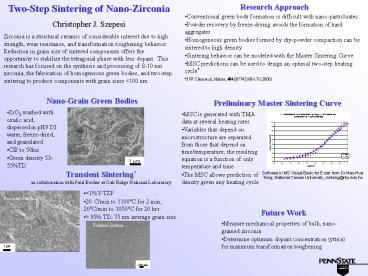TwoStep Sintering of NanoZirconia
1 / 1
Title:
TwoStep Sintering of NanoZirconia
Description:
Zirconia is a structural ceramic of considerable interest due to high strength, ... focused on the synthesis and processing of 8-10 nm zirconia, the fabrication of ... –
Number of Views:319
Avg rating:3.0/5.0
Title: TwoStep Sintering of NanoZirconia
1
Two-Step Sintering of Nano-Zirconia Christopher
J. Szepesi Zirconia is a structural ceramic of
considerable interest due to high strength, wear
resistance, and transformation toughening
behavior. Reduction in grain size of sintered
components offers the opportunity to stabilize
the tetragonal phase with less dopant. This
research has focused on the synthesis and
processing of 8-10 nm zirconia, the fabrication
of homogeneous green bodies, and two-step
sintering to produce components with grain sizes
lt100 nm.
- Research Approach
- Conventional green body formation is difficult
with nano-particluates - Powder recovery by freeze-drying avoids the
formation of hard aggregates - Homogeneous green bodies formed by dry-powder
compaction can be sintered to high density - Sintering behavior can be modeled with the Master
Sintering Curve - MSC predictions can be used to design an optimal
two-step heating cycle - I.W. Chen et al, Nature, 404 6774 168-171
(2000)
Nano-Grain Green Bodies
Preliminary Master Sintering Curve
- ZrO2 washed with oxalic acid, dispersed in pH9 DI
water, freeze-dried, and granulated - CIP to 50ksi
- Green density 53-55TD
- MSC is generated with TMA data at several heating
rates - Variables that depend on microstructure are
separated from those that depend on
time/temperature the resulting equation is a
function of only temperature and time - The MSC allows prediction of density given any
heating cycle
Transient Sintering in collaboration with Paul
Becher at Oak Ridge National Laboratory
Software in MS Visual Basic for Excel from Dr
Mao-Hua Teng, National Taiwan University,
mhteng_at_ntu.edu.tw
- lt1Y-TZP
- 20C/min to 1100C for 2 min, 20C/min to 1050C
for 20 hrs - gt 95 TD, 75 nm average grain size
Future Work
- Measure mechanical properties of bulk,
nano-grained zirconia - Determine optimum dopant concentration (yttria)
for maximum transformation toughening































